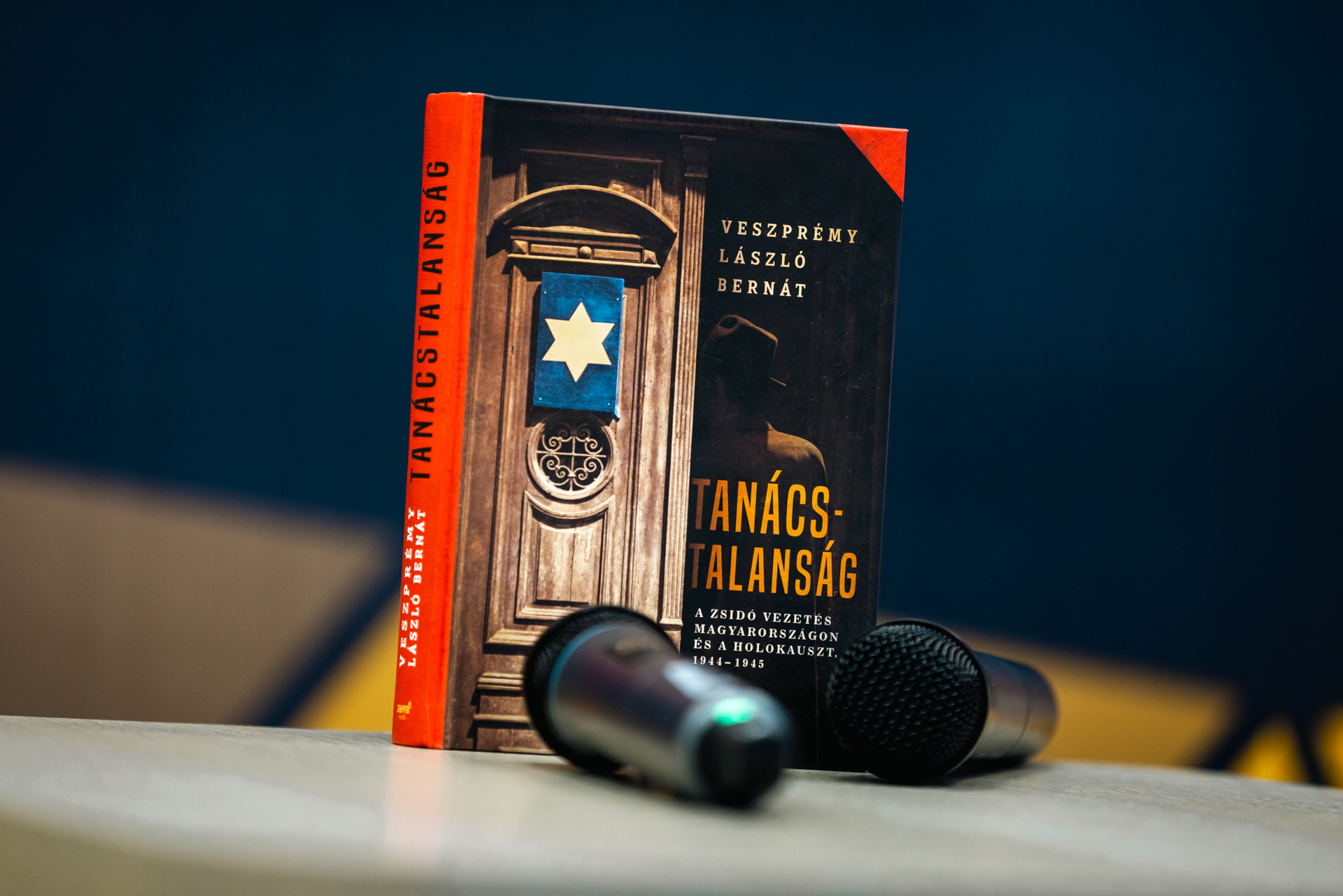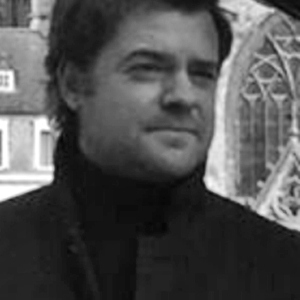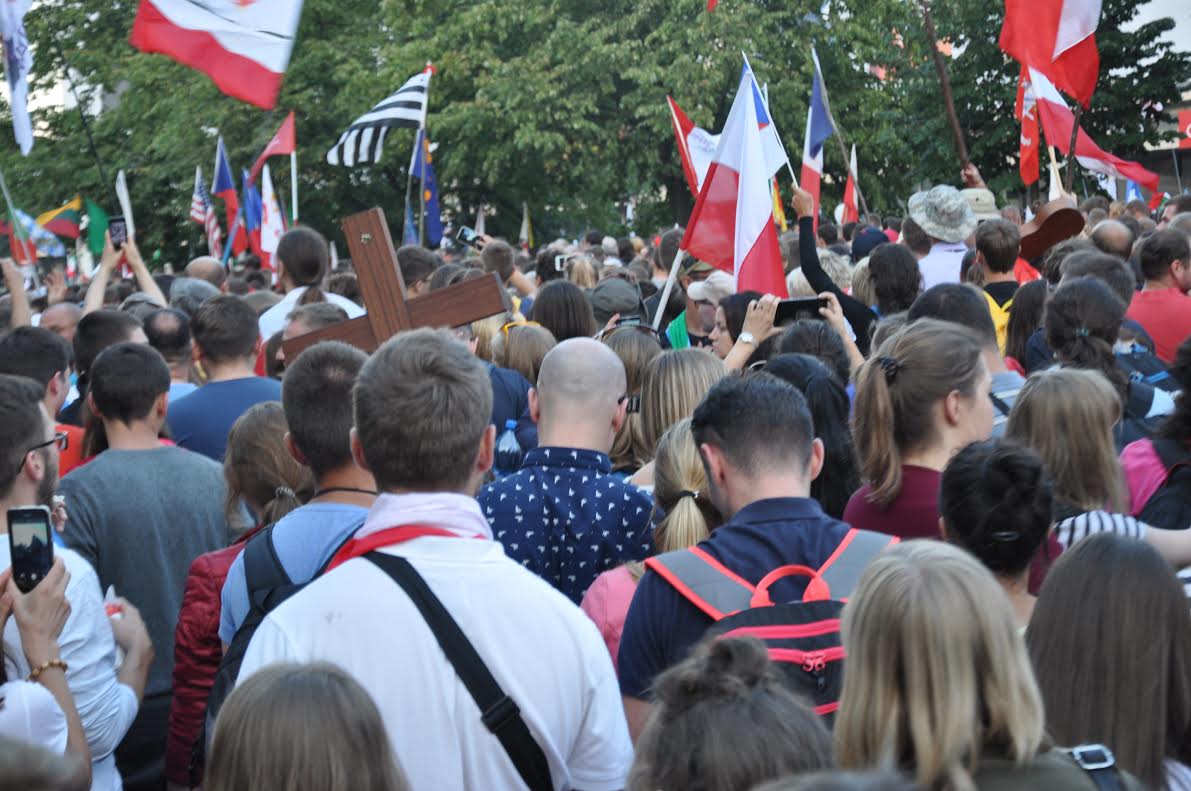Hungary – The following is an interview with the Hungarian historian, journalist, and publicist László Bernát Veszprémy, who said, “There are an amazing amount of myths, legends and lies and misconceptions about the Jewish leaders. The vast majority of these can be traced back to the post-war People’s Court, the People’s Prosecutor’s Office, and the articles that were published in the communist press.”
László Bernát Veszprémy graduated from the Reformed Károli Gáspár University and holds a Master’s degree in Holocaust Studies from the University of Amsterdam. He is currently a doctoral student at ELTE University’s School of Cultural History in Budapest. He was a contributor to the Jewish journal Szombat from 2016 to 2018 and was a researcher at the Veritas Historical Institute from 2017 to 2018. He has also been a research assistant at the Institute of Hungarian Jewish History of Milton Friedman University. Since the autumn of 2021, he has been the Editor-in-Chief of the Corvinák website, the Mathias Corvinus Collegium’s news analysis portal, after having been Deputy Editor-in-Chief of the Jewish news portal Neokohn. He is also a contributor to the conservative website and weekly Mandiner.
Last year, Yann Caspar interviewed him about two of his books on the early Horthy era and the relationship between immigration and anti-Semitism in the West. Today we interview him about a new book by László Bernát Veszprémy dealing with the Hungarian Jewish Councils during the Second World War.
Yann Caspar: We’re going to talk about your book, but first a few words about the situation in the Middle East as seen from Budapest. In the past, left-wing journalists have accused the Hungarian government of using anti-Semitic rhetoric. Today, however, it is clear that Hungary is at the forefront of support for Israel. In fact, it has been doing so for many years. So why are there such accusations against Hungary?
László Bernát Veszprémy: The accusation of anti-Semitism was a well-functioning political weapon in the hands of the left after the Second World War, and let’s face it, rightly so: after Auschwitz, few people want to be considered anti-Semites. In recent decades, however, the left has lost the support of the European white working class and has found its political supporters among Muslim-Arab immigrants. And these immigrants are definitely not looking at the Israeli-Palestinian conflict from a European progressive view of history. Not only are Muslim young people not interested in the history of the Holocaust, but sometimes they read the story in reverse: they believe that the Nazis were the ‘good guys’. This can obviously also be traced back to the Israeli-Palestinian conflict, which, when it flares up, allows them see European Jews as a legitimate target.
Yann Caspar: Your new book, Tanácstalanság, deals with Jewish councils in Hungary during World War II. Could you explain what these Jewish councils were and what prompted you to write this book?
László Bernát Veszprémy: When I did my degree in Holocaust studies at the University of Amsterdam, I naturally tried to look at the literature on the Holocaust in Hungary. I was confronted with the fact that there were books on the Jewish Councils of the Netherlands, Poland, and other countries, but there is a lack of literature concerning Hungary. In 1990, Mária Schmidt published a very good and important reference work on the Budapest Jewish Council. There are also a few articles, studies, of course, that have been written. They’re very important, and I’ve referred to them, but there was no coherent monograph of texts that dealt with the history of the Hungarian Jewish leadership in the capital and in the countryside during the German occupation. I felt this was an amazing omission and it needed to be written. The book does not only deal with the Jewish councils, but also with rabbis, community leaders, a little bit about Zionists, but I tried to avoid as much as possible the Kasztner case.
I’m dealing with these Jewish councils created by the Germans. The logic was that the Jews would obviously accept orders more easily from a Jewish leader than from, say, SS officers, so the Germans therefore forcibly concentrated the Jewish leaders into these councils, it was a forced unit. They communicated with the Jews through these councils and passed on the demands to them. They had to set up two police forces, a Jewish police forces, and in some rare cases here in Hungary it was their job to select who should go to Auschwitz and who should go to Strasshof near Vienna, which was also a terrible concentration camp, but it was not explicitly an extermination camp, so it gave them a slightly greater chance of survival.
Yann Caspar: Are there so few sources because this subject is full of myths?
László Bernát Veszprémy: There are an amazing amount of myths, legends and lies and misconceptions about the Jewish leaders. The vast majority of these can be traced back to the post-war People’s Court, the People’s Prosecutor’s Office, and the articles that were published in the communist press. These articles were usually spread in such a way that, say, during the investigative phase of a People’s Court, a witness for the prosecution at the secret police made a statement in which he said that « X.Y. was a Jewish leader. I heard that he did something. » For example « He raped a Jewish woman. » Then they leak this in the communist press at the investigative stage, and they just write in the headline that a Jewish leader was a Nazi fascist collaborator. So these articles spread so well that on the one hand they became part of the public consciousness, and on the other hand they are still quoted in literature, fiction, articles, on internet forums, because they are scanned and posted, and to this day you can find articles which, if you look at the source, are distorted communist press articles, but they are still circulating and quoted to this day.
Yann Caspar: In Western Europe, Miklós Horthy is thought by many to have played a direct role in the deportation of Hungarian Jews. Reading your book, one can say that this was not really true. For example, you mention the Koszorús operation. Could you clarify a little bit about Miklós Horthy’s role? How did he cooperate with the German occupiers, or what was his relationship with them on the one hand, and on the other hand how did he cooperate with the Jewish leaders, because he was in constant contact with them, if I understand.
László Bernát Veszprémy: Yes. Miklós Horthy of course had a role in the Holocaust, he signed Jewish laws, we know that he didn’t prevent the deportation of rural Jews, so overall my opinion of Horthy is negative, I don’t want to exonerate him for anything. But obviously in the light of the objective sources, the historical facts and truth that can be known should be recorded. It must be seen that the German occupiers and the collaborationist Hungarian government, in particular the Ministry of the Interior and the law enforcement agencies, are primarily responsible for the deportations in Hungary, and that those responsible can also be found in local administrations, chief bailiffs, deputy bailiffs, mayors, notaries, who made the deportations possible. The first question to be asked about Miklós Horthy is, of course, when exactly he first became aware of what was happening to Hungarian Jews in Auschwitz, and what was happening to the Jews who were being deported there. Not all the trains went to Auschwitz. We know that there were some trains that went to Strasshof, but the majority of the trains did go to Auschwitz. It is a question of when Horthy actually learned what was happening here, and it is also a very important question of when he internalises the information.

Yann Caspar: Because you could read that in Jewish newspapers. So, they knew about it, but they didn’t want to believe it?
László Bernát Veszprémy: Yes, basically what I saw when I looked at what could be found out in non-Jewish and Jewish press before the German occupation, you can see that while you couldn’t read about Auschwitz itself and the gas chambers, you could read about mass murders abroad, about yellow stars, ghettoisation, deportation, concentration camps. The name Dachau was mentioned, it was written down that Jews were murdered there. And I have not even mentioned the conscripts and soldiers who, by the thousands, faced the slaughter of Jews in the Soviet Union on the Eastern Front. This was so true, in fact, that even before the German occupation, a prize-winning war diary was published by a Hungarian soldier who described the extermination of the Jews of a Soviet town by the Germans, and the book was later banned, but reviews of it appeared in the Hungarian press, so we know that it was in circulation at that time.
Coming back to Horthy, I don’t think the debate is closed as to when Horthy became aware of these things, and I don’t think it’s impossible that it happened shortly before the Koszorús operation. Basically, it must be seen that the Germans had already planned the deportation of the Jews of Budapest, the gendarmes were ordered to the area, and then on 6 July Horthy used the Esztergom armoured division to remove the gendarmes from the capital. The Esztergom panzer regiment was led by Lieutenant Colonel Ferenc Koszorús, and historians have argued a lot about Horthy’s intention, i.e. about the purpose for which Horthy ordered the Esztergom panzer regiment here. There was one historian who pointed out that Horthy did not want to save the Jews, but was afraid of the gendarmes, a gendarme coup, led by Baky.
Yann Caspar: László Baky, then State Secretary of the Interior.
László Bernát Veszprémy: Yes, he was a former Arrow Cross politician.
Yann Caspar: But Hitler at that time, in June and July, did not expect Arrow Cross members to take over in Budapest.
László Bernát Veszprémy: This coup was a fabrication. László Ferenczy, a Lieutenant Colonel of the Gendarmerie, told later the People’s Court that this was all invented to mask and hide the fact that the regular Hungarian army was being used against the Hungarian police. Why was it necessary to conceal this? I think it’s understandable, because there was a strong anti-Semitic feeling in Hungary at the time, and many people might not have been happy about the fact that Hungarian soldiers were being used against the gendarmes in the interests of the Jews.
But how do we know what Horthy’s intentions were? In my book, I quote the diary entry of Colonel General János Vörös, in which he describes how, the day before the operation, Horthy summoned him and told him that his aim was to rescue the Jews of Budapest. So from this we might believe that Horthy had both aims. Yes indeed, but we know that the coup of the gendarmes was just a fiction, which somehow those in the Interior Ministry who wanted to prevent the deportations, for example László Ferenczy, or the Jewish Council and the Government’s Cabinet Office, came up with together as a fiction to hide the Koszorús operation.
It is also very important to see that the German demands do not stop there, that the Germans were constantly demanding the deportation of the Jews of Budapest and the continuation of the deportations. We know that the deportations from the suburbs, from the agglomeration, continue to be carried out, even after the Koszorús operation. Later on, the Germans deported people from the internment camps in Sárvár and Kistarcsa on their own initiative, despite Horthy’s protests and opposition. And here comes the next little known chapter of the story, the fake deportation plans. Sometime in the last days of August or the first days of September, sources differ, there was a meeting between Samu Stern, the leader of the Jewish Council of Budapest and Miklós Horthy. They talk about this fake- or pseudo-deportation plan. This idea was that the Jews of Budapest would be rounded up in a concentration camp outside Budapest and then deported from there to Auschwitz. The whole idea of building a new concentration camp was to stall for time. They wanted to stall for time so that in the end there would be no time to deport the Jews of Budapest. This is what happened, by the way.
Yann Caspar: At the very end of August, Miklós Horthy appointed a new prime minister, Béla Lakatos, whose role was to make peace. So in August 1944 they thought that the war might be over, and maybe that’s why they were stalling and trying to convince the Germans that it was going to happen in the hope that it could be brought to a conclusion?
László Bernát Veszprémy: Basically, it was to stall until the deportation of the Jews in the capital could not take place. We have these sources that Horthy gave permission for the concentration of the Jews of Budapest outside Budapest. This has been reported by historians as a result of Miklós Horthy, an enthusiastic deporter, changing his mind about stopping the Koszorús action, and after the Koszorús action he did authorise the deportations again, but this did not take place in the end.
This document was completely misunderstood and an attempt to save people was interpreted as an attempt to deport them. In fact, we know that it was the Jewish leaders who first supported it. But then certain Jewish leaders start to think. For example, Samu Stern, the Jewish council president, who was also the head of the Jewish Community of Pest. What if they really build this concentration camp and really deport the Jews of Budapest? So they get scared. And when Stern went to Horthy, he already expressed his opposition to the plan, and it seems likely that this is why Horthy eventually backed away from this plan, but you have to see that there was basically cooperation between the Jewish Council and the Government’s Cabinet Office, and the intention all along was to save the Jews of Budapest.
Yann Caspar: It can be said that what happened in the last months of the war were German instructions, and to these Miklós Horthy tried to adapt. He would never have carried out such deportations of his own volition? This may seem an absurd question for a Hungarian historian, I know, but many in Western Europe believe that Miklós Horthy was responsible for everything.
László Bernát Veszprémy: No one disputes that the German occupation of Hungary was necessary to start the mass deportations. I think it’s completely self-evident, Hungary was occupied by the Germans, the former legitimate Hungarian government was dismissed, the Prime Minister deported to a concentration camp, the Minister of the Interior also. To pretend here that there would have been forced deportations even without the German occupation is a serious misunderstanding of events.
Yann Caspar: Here in Hungary, too, left-wing journalists sometimes get things mixed up.
László Bernát Veszprémy: I’m not concerned, I’m a historian. Historians don’t dispute that the German occupation here has fundamentally transformed and changed the events. This is the point after which the yellow star, ghettoisations and deportations begin. Now we have to see that one of Horthy’s great sins was that he did not do more in time to save the Jews in the countryside. The question arises in the historian’s mind that whoever could have stopped the deportations on 6 July could have stopped them earlier. However, this does not mean that he would not have had a role in saving the Jews of the capital, which to some extent he did.
Yann Caspar: If we’re talking about saving the Jews, how much does that mean in proportion?
László Bernát Veszprémy: The contemporary documents said that there were about 250,000 Jews hiding in Budapest. I feel this is exaggerated, we historians agree on 150,000. It may be slightly more, it may be slightly less. Of course, escape is a relative term here, since later on it was abandoned, and after the Arrow Cross coup the ghettoisation of the capital began again, and mass murders took place.
Yann Caspar: Later came the Soviet occupation, and the narrative that the Jews, the Jewish leaders, cooperated. They were collaborators with the German Nazi occupiers. What was the reason for that, why was that narrative, and how much does it still influence the discourse today?
László Bernát Veszprémy: Let me just add a brief thought to the previous one, that basically you have to see that the Koszorús operation, and then later the fake deportation plans, were done in collaboration between the Government’s Cabinet office and the Jewish Council. One cannot separately condemn Miklós Horthy and at the same time acquit the Jewish Council. You either have to recognize their interests together or condemn them together. I don’t see a position that can handle the two.
And then the Soviet narrative. It was very important for the Soviets to inculcate that anyone could be a fascist. This was published specifically in communist articles in Szabad Nép, suggesting that Miklós Horthy and the Arrow Cross and the Jews who collaborated with the Nazis were equally fascist. This was important, in my opinion, for the communists because they knew even then that there would be Soviet-style showdowns on the left. One of the very first people to be tried in the People’s Court was Pál Demény, who was a Jewish-born communist resistance fighter. His only crime was that he did not accept Rákosi’s autocracy on the Communist side, so he was not a Muscovite.
Yann Caspar: Rákosi, who was in Moscow at the time.
László Bernát Veszprémy: He was not a Holocaust survivor, yes. So the communists knew that there would have to be such a crackdown, and they obviously needed to instil in the minds of the population the idea that the fact that someone was a communist or a Jew or maybe a Holocaust survivor who had been to Auschwitz did not absolve him from the charge of being a fascist, an imperialist or a Gestapo spy.
These accusations were then actually made in the Rajk trial, so there were second or third-rate defendants in the Rajk trial who were, for example, of Jewish origin, Szőnyi and Szalai. And we know that the indictment said that they were Gestapo spies, and that they had handed over their fellow unarmed labour servicemen to the Hungarian secret police. So this ‘Jewish collaborator’ narrative was very important for the communists to push. In that sense, the Jewish leaders, the Jewish councils, were a convenient, obvious target. They were conservative, they were capitalist, they were often wealthy, they could be blamed for being the ‘wealthy right-wing Jewish leaders’ who ‘collaborated’ with the Horthy regime and the Nazis and handed over rural Jews for deportation just to save their own skins. The vast majority of these accusations, according to my research, are not true. Many of the members of the Jewish councils also died, and their families were exterminated. If they may have survived the Holocaust, they also suffered, suffering from labour camps, frost, famine, disease.
But I did find some of the accusations to be justified in the light of the sources. It is true that in certain rural concentration camps, for example in Szolnok, Szeged, Debrecen, Kolozsvár, the Jewish councils were selective. We know, for example, that there was discrimination against Jews who had converted to Christianity, and we know from the People’s courts that several Jewish council members were brought before the People’s courts in Budapest and in the countryside, and that they were convicted in the first instance and acquitted in the second instance. This narrative, which has been pushed in the press and in the People’s courts, that the fascist Jewish leaders betrayed the Jewish working class, is a blatant distortion of the Holocaust, and I have tried to refute it thoroughly in my book.
Yann Caspar: Are there tensions among Hungarian Jews about your book? What kind of reactions did you get after the book was published?
László Bernát Veszprémy: The reception of my book has been very positive so far. There was a positive review on the Zsima site, a neolog site, and also on the Neokohn news portal, which is an orthodox Jewish portal. So far I have read only positive articles starting with Index, Élet és Irodalom to Magyar Hang.
The reception from the citizens was positive, and representatives of local religious communities were present at several rural book launches. I have received several letters from rabbis, people from religious communities, leaders, asking for copies, asking me to sign them, thanking me very much, and I can see that there is a great joy. I have also received such question as to why it is necessary to deal with this at all, it is better not to write anything about it, but I have heard also, mainly from Jewish leaders, that now at last we can know what the Jewish leaders did.
Yann Caspar: I have the feeling that in France, in Western Europe, it would be much harder to get it published.
László Bernát Veszprémy: In Hungary, there is absolute freedom of speech, no one disputes that, and freedom of research. I see among the Jewish leaders that there is a relief that now at last you can read what their predecessors did, because it’s important to see that the Jewish councils were created from the congregations. So whoever is today a community chairman or a rabbi is, so to speak, sitting in the chair of his predecessors, the same people who sat in the same chair 80 years ago. That’s what this book is about, and the Jewish leaders I’ve spoken to are pleased that they can finally read an authentic account of them, and learn that maybe their ancestors weren’t bloodthirsty fascists after all.




